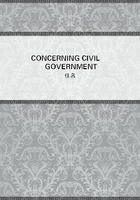
第39章
153. It is not necessary- no, nor so much as convenient- that the legislative should be always in being; but absolutely necessary that the executive power should, because there is not always need of new laws to be made, but always need of execution of the laws that are made. When the legislative hath put the execution of the laws they make into other hands, they have a power still to resume it out of those hands when they find cause, and to punish for any mal-administration against the laws. The same holds also in regard of the federative power, that and the executive being both ministerial and subordinate to the legislative, which, as has been shown, in a constituted commonwealth is the supreme, the legislative also in this case being supposed to consist of several persons; for if it be a single person it cannot but be always in being, and so will, as supreme, naturally have the supreme executive power, together with the legislative, may assemble and exercise their legislative at the times that either their original constitution or their own adjournment appoints, or when they please, if neither of these hath appointed any time, or there be no other way prescribed to convoke them. For the supreme power being placed in them by the people, it is always in them, and they may exercise it when they please, unless by their original constitution they are limited to certain seasons, or by an act of their supreme power they have adjourned to a certain time, and when that time comes they have a right to assemble and act again.
154. If the legislative, or any part of it, be of representatives, chosen for that time by the people, which afterwards return into the ordinary state of subjects, and have no share in the legislative but upon a new choice, this power of choosing must also be exercised by the people, either at certain appointed seasons, or else when they are summoned to it; and, in this latter case, the power of convoking the legislative is ordinarily placed in the executive, and has one of these two limitations in respect of time:- that either the original constitution requires their assembling and acting at certain intervals; and then the executive power does nothing but ministerially issue directions for their electing and assembling according to due forms; or else it is left to his prudence to call them by new elections when the occasions or exigencies of the public require the amendment of old or making of new laws, or the redress or prevention of any inconveniencies that lie on or threaten the people.
155. It may be demanded here, what if the executive power, being possessed of the force of the commonwealth, shall make use of that force to hinder the meeting and acting of the legislative, when the original constitution or the public exigencies require it? I say, using force upon the people, without authority, and contrary to the trust put in him that does so, is a state of war with the people, who have a right to reinstate their legislative in the exercise of their power. For having erected a legislative with an intent they should exercise the power of making laws, either at certain set times, or when there is need of it, when they are hindered by any force from what is so necessary to the society, and wherein the safety and preservation of the people consists, the people have a right to remove it by force. In all states and conditions the true remedy of force without authority is to oppose force to it. The use of force without authority always puts him that uses it into a state of war as the aggressor, and renders him liable to be treated accordingly.
156. The power of assembling and dismissing the legislative, placed in the executive, gives not the executive a superiority over it, but is a fiduciary trust placed in him for the safety of the people in a case where the uncertainty and variableness of human affairs could not bear a steady fixed rule. For it not being possible that the first framers of the government should by any foresight be so much masters of future events as to be able to prefix so just periods of return and duration to the assemblies of the legislative, in all times to come, that might exactly answer all the exigencies of the commonwealth, the best remedy could be found for this defect was to trust this to the prudence of one who was always to be present, and whose business it was to watch over the public good.
Constant, frequent meetings of the legislative, and long continuations of their assemblies, without necessary occasion, could not but be burdensome to the people, and must necessarily in time produce more dangerous inconveniencies, and yet the quick turn of affairs might be sometimes such as to need their present help; any delay of their convening might endanger the public; and sometimes, too, their business might be so great that the limited time of their sitting might be too short for their work, and rob the public of that benefit which could be had only from their mature deliberation.